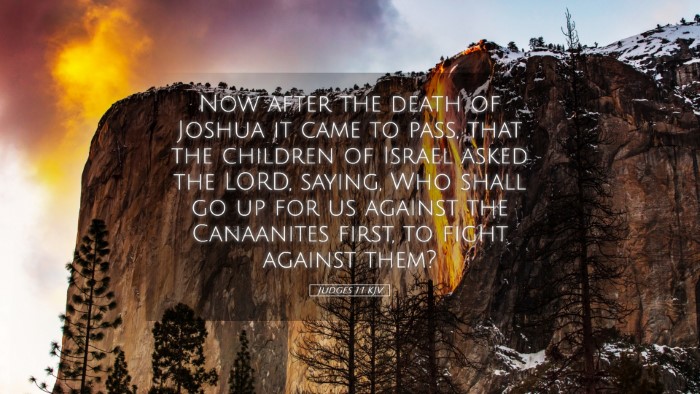Commentary on Judges 1:1
Verse Reference: Judges 1:1 - "Now after the death of Joshua it came to pass, that the children of Israel asked the Lord, saying, Who shall go up for us against the Canaanites first, to fight against them?"
Introduction
The Book of Judges begins with a poignant moment following the death of Joshua, a leader who played a pivotal role in the conquest of Canaan. Judges 1:1 marks the commencement of an era characterized by fragmentation and moral decline among the Israelites. The inquiries made by the people underscore the pressing need for divine guidance and leadership as they confront the ongoing threats from the Canaanite nations.
Contextual Analysis
Understanding Judges 1:1 requires a grasp of its historical and theological context. As noted by Matthew Henry, this verse illustrates a transition from a unified conquest under Joshua to a decentralized struggle for survival. The Israelites, now without their esteemed leader, are faced with overwhelming uncertainties. The question raised—"Who shall go up for us?"—indicates their reliance on God for direction in battle.
Theological Implications
Albert Barnes emphasizes the importance of divine consultation before any military action. The Israelites' decision to seek the Lord shows a recognition of their dependence on Him. It illustrates the biblical principle that success in spiritual and physical endeavors requires God’s guidance. The act of consulting God indicates a desire to adhere to divine will, a recurring theme throughout the scriptures.
Exegetical Insights
- After the Death of Joshua: The mention of Joshua’s death is crucial. Joshua, a devoted servant of the Lord, had effectively led Israel into the Promised Land. His death signifies a pivotal moment where the Israelites must now navigate their future without his leadership. Adam Clarke points out that Joshua’s absence creates a leadership vacuum that invites chaos and uncertainty.
- The Children of Israel: The collective nature of "the children of Israel" indicates a communal identity. Their question underscores the necessity of collaborative decision-making in spiritual matters. The mention of "asking the Lord" integrates the communal faith in the necessity of divine approval in their quest.
- Who Shall Go Up: Their inquiry, "Who shall go up?" reveals a strategic approach toward confronting the Canaanites. It resonates with the broader themes of authority and action within the biblical narrative. Matthew Henry elucidates that this indicates the Israelites acknowledge a hierarchical order where God is the arbitrator of their battles.
- Against the Canaanites: The Canaanites symbolize the persistent adversaries of Israel. Their presence serves as a spiritual and moral challenge. Albert Barnes argues that the Canaanites represent not only a physical threat but also a spiritual one, as their idolatry and practices were repugnant to the covenant relationship God established with Israel.
Practical Applications
The implications of Judges 1:1 extend beyond theological discourse and provide rich applications for today’s believers. Pastors and theologians can draw several lessons:
- The Importance of Seeking Divine Guidance: Like the Israelites, believers today must prioritize consultation with God concerning decisions, especially those requiring strength and courage. Prayer must be at the forefront of our actions.
- Unity in Pursuit of God’s Will: The communal aspect of their inquiry demonstrates the necessity of collaboration among God's people. In church contexts, seeking collective divine direction fosters unity and shared purpose.
- Facing Adversity with Faith: The recognition of Canaanites as adversaries reflects the internal and external struggles believers face. This verse encourages congregants to confront their challenges head-on with faith and reliance on God.
- The Need for Leadership: With Joshua's absence, the void in leadership indicates a crucial point for the development of new leaders, reminding contemporary churches of the importance of raising and equipping future leaders.
Conclusion
Judges 1:1 serves as a profound reminder of the need for divine leadership and guidance in challenging times. The Israelites' decision to seek the Lord illustrates the necessity of faith-filled inquiry before engaging in any ventures. Through their example, pastors, students, and theologians can glean insights that apply to collective and individual faith journeys today, fostering a deeper understanding of reliance on God amidst adversity.


